Physical Address
304 North Cardinal St.
Dorchester Center, MA 02124

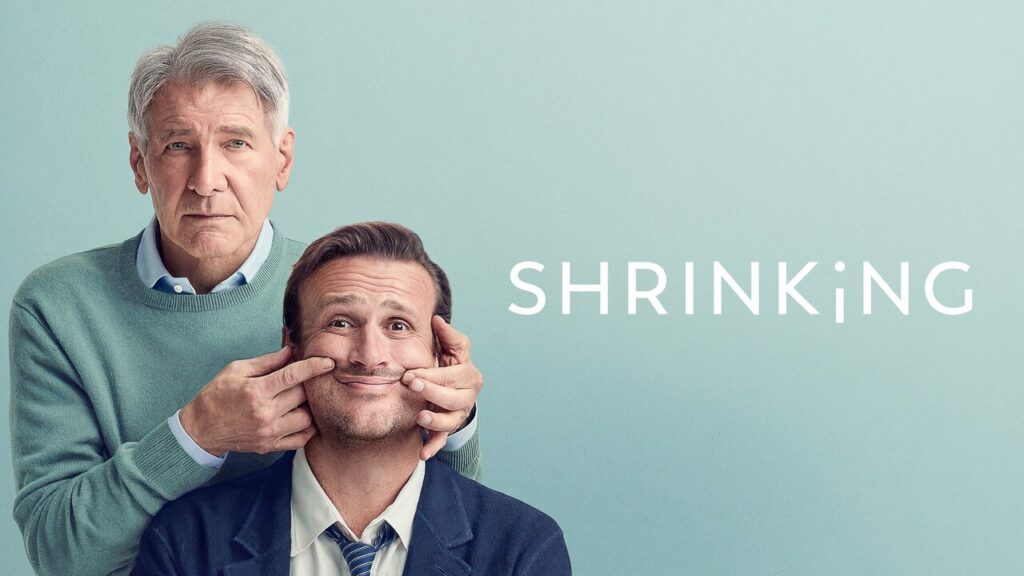
Diving into Apple TV+ content for the first time, I couldn’t be more excited to review Shrinking, currently the platform’s most popular show. Apple TV+ has always intrigued me for its approach to storytelling—offering a curated selection rather than an endless lineup. In my recent post on the platform, I learned about how Apple TV+ distinguishes itself by producing series that are both carefully chosen and crafted with an eye for quality.
This focus on quality rather than quantity aligns with my blogging philosophy, making it feel like the perfect time to explore what Apple TV+ has to offer. I chose Shrinking as my first review because it’s not only the top show on the platform but also a standout for its casting and thematic depth.
In my research before watching, I discovered that Shrinking brings together a powerhouse team of creators, Bill Lawrence, Jason Segel, and Brett Goldstein, who are each known for blending comedy with heart. Lawrence’s past successes with Scrubs and Ted Lasso have showcased his talent for creating lighthearted yet deeply meaningful stories, while Goldstein’s work as both writer and actor on Ted Lasso has earned him recognition for balancing genuine warmth with humor.
Segel, who not only stars in the series as Jimmy Laird but also co-created it, has a history of portraying characters with a mix of humor and vulnerability. Knowing the backgrounds of these creators set my expectations high; they seemed uniquely equipped to handle a story that would need to balance humor with profound, raw emotion.
The premise of Shrinking also intrigued me. The story follows Jimmy, a therapist grieving the recent loss of his wife, Tia. In his attempts to process his grief, he starts breaking traditional therapeutic boundaries, often sharing personal stories and unconventional advice with his clients. This dynamic, while comedic, hinted at the potential for exploring themes of mental health, boundaries, and healing.
Right away, I could tell that Shrinking wouldn’t be a straightforward comedy but rather a show that would use humor as a vehicle to dive into weighty, often uncomfortable topics. I was drawn to the idea that Shrinking could create a unique space where grief and growth are portrayed not as straightforward journeys but as complex, sometimes messy processes.
Then there was the casting of Harrison Ford as Dr. Paul Rhoades, Jimmy’s colleague and mentor—a decision that made Shrinking even more exciting to me. Ford, known worldwide for his iconic roles as Indiana Jones, Han Solo, and countless other characters, has rarely ventured into television, especially in such a deeply personal, emotionally driven role.
His presence in Shrinking immediately adds an extra layer of interest, as he brings both gravitas and warmth to the series in a way that perfectly complements its themes. Ford’s portrayal of Paul, a seasoned therapist who is dealing with his own struggles, including Parkinson’s disease, intrigued me. His character’s journey hinted at a more vulnerable side of Ford than we typically see, providing a rare opportunity to experience his acting style in a new, intimate context.
From my research, I also learned that Ford was drawn to this role because of its blend of humor and emotional depth—a combination that would allow him to explore a different facet of his career. As someone known for his roles in epic adventures and blockbuster films, Ford’s decision to dive into a more grounded, character-driven show like Shrinking signaled that this was no ordinary comedy.
His character, Paul, is both a mentor and friend to Jimmy, guiding him through his grief while facing his own challenges. This partnership, I found, reflects the show’s core theme of finding solace and growth in unlikely friendships, and Ford’s experience brings authenticity to this role that few others could achieve.
All of this research set up my expectations and excitement for watching Shrinking. I was prepared for a show that would challenge typical genre conventions, offering moments of sincerity alongside understated humor. I anticipated that the humor wouldn’t be just for laughs; instead, it would support the show’s exploration of grief, mental health, and personal healing.
Shrinking promised a delicate blend of comedy and heart—a combination that I think is perfectly suited for Apple TV+, which seems to prioritize series that give audiences a meaningful, thought-provoking experience. Ford’s move to television, combined with the talents of Lawrence, Segel, and Goldstein, signaled that Shrinking would likely resonate beyond surface-level laughs, digging into themes of connection and vulnerability.
So, as I sat down to watch Shrinking, I was ready for a slow burn—a show that wouldn’t necessarily rely on fast-paced jokes but would instead draw viewers in through its characters and their journeys. Knowing the depth and care behind its creation, I looked forward to discovering how Shrinking would tackle these challenging themes, making room for both humor and heart.
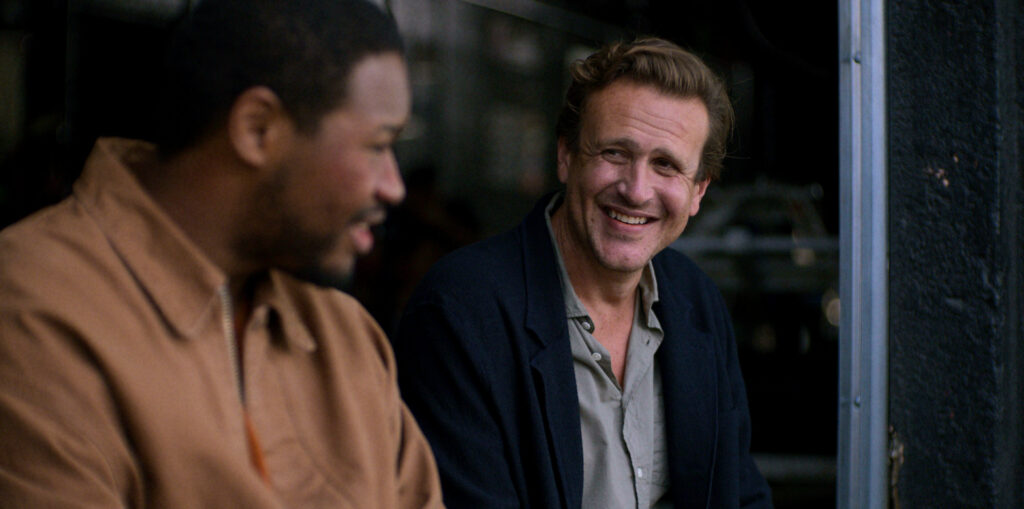
Bill Lawrence, Jason Segel, and Brett Goldstein are known for their ability to blend humor with emotional weight in ways that connect deeply with audiences. Lawrence, who is celebrated for his work on Scrubs and Ted Lasso, has always brought a talent for finding humor in heavy topics, balancing lighthearted moments with profound storytelling.
Segel and Goldstein add their unique voices as well—Segel with his knack for vulnerable characters and Goldstein with his experience in character-driven comedy. Together, their collaboration in Shrinking has created a series that feels both grounded and heartfelt, using comedy not to escape reality but to explore it more honestly.
At the heart of Shrinking is the story of Jimmy Laird (played by Jason Segel), a therapist struggling with the loss of his wife, Tia. Grief hits Jimmy hard, but instead of processing it in a controlled, introspective way, he begins to unravel. His pain manifests in unusual, sometimes reckless ways: he starts hosting loud, late-night parties, blurring boundaries with his clients, and delivering unfiltered, often impulsive advice.
In the very first episode, we see him in the throes of one of these chaotic episodes, playing air piano at 3:00 AM with music blaring, two strangers in his pool, and a bottle in hand. This isn’t what one would expect from a therapist, yet this scene quickly tells us that Jimmy is far from the professional, stable figure he once was.
Jimmy’s daughter, Alice, suffers quietly as she watches her father fall apart. The first few episodes are filled with interactions that show her frustration and sense of betrayal—she is mourning her mother, too, but feels abandoned by the one person she should be able to rely on. Jimmy’s neighbor, Liz (Christa Miller), steps in to help Alice, taking on a role that Jimmy seems unwilling or unable to fulfill. This distance between Jimmy and Alice becomes one of the central emotional threads of the show, as we see the weight of Jimmy’s grief slowly pull him back into his family’s life.
As I began watching, it became clear that Shrinking doesn’t aim for a fast-paced narrative or a quick emotional payoff. Instead, the series takes its time to draw us into Jimmy’s world. The first episode unfolds at a deliberate pace, revealing just enough of each character to make us curious about their stories.
Rather than relying on big, dramatic moments, the show focuses on the slow, often messy process of grieving and the complexities of healing. Jimmy’s journey is far from linear; he stumbles, makes mistakes, and pushes boundaries as he searches for a way to cope with his loss. It’s a slow burn in every sense, and while this approach might feel understated, it aligns beautifully with the show’s themes.
This patient storytelling style allows the show to explore not just Jimmy’s grief but also his journey toward growth. Each episode slowly unveils the layers of his struggle, making it clear that healing is rarely neat or immediate. For example, Jimmy begins to confront his grief by radically shifting his approach to clients, no longer holding back his personal opinions or masking his frustrations.
This shift is jarring to those around him, particularly his colleague Paul (Harrison Ford), who has long adhered to the boundaries expected in therapy. Jimmy’s unconventional methods with his patients, such as telling one woman, Grace, to leave her husband or taking a troubled veteran, Sean, to an MMA gym, highlight his inability to manage his own life while attempting to save others.
The show skillfully balances these moments of comedic chaos with softer, more intimate scenes that allow Jimmy’s vulnerability to shine through. Though he might come across as reckless and irresponsible in the beginning, we gradually see that his actions are rooted in deep, unresolved pain.
By approaching grief through this imperfect, slow-burning journey, Shrinking offers viewers a version of healing that feels raw, real, and authentic. The story doesn’t try to gloss over the hard parts or skip ahead to a neat resolution; instead, it lingers in the discomfort, giving each character space to grow at their own pace.
Shrinking explores mental health, personal growth, and relationships in ways that feel sincere, resisting the typical sitcom approach of quick jokes or easy solutions. By letting us see Jimmy at his lowest, struggling through his grief in often messy and chaotic ways, the show lays the groundwork for genuine growth.
It reminds us that real change takes time, and healing is not a linear journey but one filled with setbacks, breakthroughs, and often surprising moments of self-discovery. As the first episode ends, we’re left with a deeper understanding of Jimmy’s world, his complex relationships, and his tentative steps toward finding balance—a slow burn that leaves us wanting to see more of where this journey will take him.
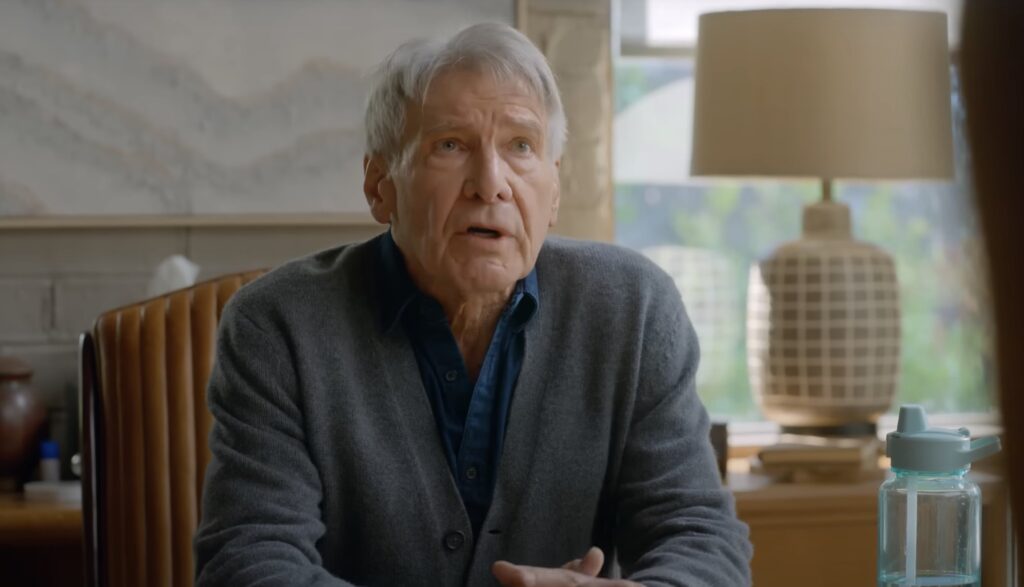
One of the show’s biggest surprises—and draws—is Harrison Ford’s role as Dr. Paul Rhoades, Jimmy’s senior colleague and mentor. Ford, known globally for iconic film roles like Indiana Jones and Han Solo and his dramatic turns in The Fugitive and Blade Runner, has rarely ventured into television. The decision to step into a series like Shrinking and bring his legendary talent to the “small screen” is a rare move that signifies just how special this project is. It’s no exaggeration to say that Ford’s presence elevates the series, bringing an element of gravitas and familiarity that reinforces its themes of resilience, vulnerability, and self-reflection.
In Shrinking, Ford’s character, Paul, is a seasoned therapist facing his own personal battles with aging and the early stages of Parkinson’s disease. Ford’s portrayal adds a raw, complex layer to the show; he embodies a character who is wise but also struggles to accept his own limitations and the reality of his condition. This vulnerability stands in contrast to the rugged, powerful heroes Ford has played in the past, showcasing a side of him we don’t often get to see. It’s a nuanced performance that demands subtlety and restraint, traits Ford brings with his signature finesse.
In my research, I discovered that Ford was drawn to Shrinking because the role of Paul offered him the chance to work with comedy in a more direct way than he has in his action-oriented or dramatic film work. Though Ford has always had a quiet, understated humor, even in his more serious roles, Shrinking gives him a space to explore that comedic side with a mix of dry wit and empathy.
His character’s humor isn’t loud or slapstick; it’s woven into Paul’s wry observations and his gentle ribbing of Jimmy. Whether he’s critiquing Jimmy’s unconventional therapy methods or sharing a gruff but compassionate word of advice, Ford’s humor serves as a grounding force for Jimmy’s more chaotic tendencies.
Ford’s involvement in Shrinking also reflects his willingness to take creative risks. For an actor of his stature, whose career has been defined by blockbusters and cultural icons, this role is something of a departure, allowing him to dive into a character-driven, emotionally rich narrative. Working alongside showrunner Bill Lawrence and co-stars Jason Segel and Jessica Williams, Ford clearly embraced the collaborative atmosphere of the series, a factor that he’s said he found appealing. Lawrence, Segel, and Goldstein’s reputation for creating character-driven stories undoubtedly reassured Ford that this would be a project handled with care and intention.
In addition to Ford’s natural humor, there’s a sense of authority he brings to Paul that grounds the show’s more intense themes. His character often serves as a mentor to Jimmy, guiding him through his grief, yet Paul’s own struggles make him relatable. His advice isn’t perfect, nor is his life free from setbacks, he’s managing his condition quietly, sometimes with frustration and moments of denial, but always with dignity.
In scenes where Paul and Jimmy interact, Ford skillfully balances the roles of mentor and friend, supporting Jimmy without offering easy solutions. This complexity makes Paul more than just a side character; he’s a crucial counterbalance to Jimmy’s impulsive approach to therapy and life.
Ford’s decision to enter streaming with Shrinking—and in such a vulnerable, grounded role—sends a clear signal about the value of today’s television landscape. Streaming platforms, like Apple TV+, now offer actors the opportunity to explore characters and stories in more layered, long-form narratives than typical films allow.
This role gives Ford room to explore Paul’s journey with aging and Parkinson’s over time, which is something a film’s two-hour limit wouldn’t permit. Ford’s commitment to the role shows his recognition of the evolving TV medium, where emotionally complex roles like Paul’s are developed gradually, allowing audiences to connect with the character at a deeper level.
As I watched, I could see why Ford was drawn to the character of Paul and why his presence in Shrinking felt so refreshing. His performance brings subtlety and depth that not only reinforces the show’s themes but also pushes us, as viewers, to embrace the imperfections of the characters. Ford’s involvement in Shrinking not only highlights his versatility as an actor but also underscores the unique strengths of Apple TV+’s approach to storytelling. It’s a treat to see an icon like Ford takes on such an introspective role, blending his dry humor and gravitas to create a performance that’s as emotionally resonant as it is quietly humorous.
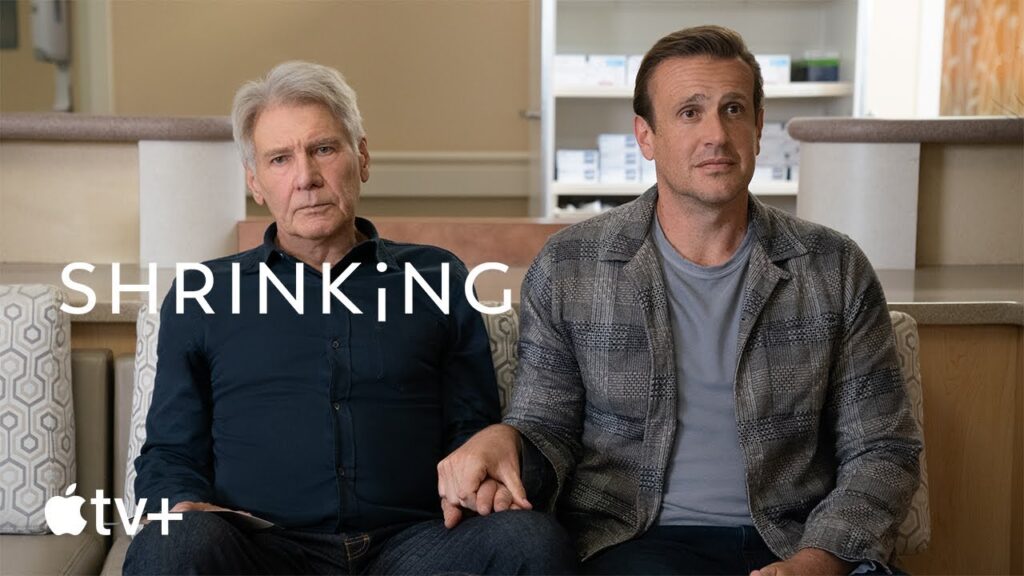
When I started watching Shrinking, I didn’t immediately find it especially funny. Some jokes fell flat, and the early scenes lacked the punch I typically expect in a pilot episode, especially one that’s labeled as a comedy. There were awkward silences and subtle attempts at humor that seemed to float by without much impact, and the overall tone felt understated rather than laugh-out-loud funny.
However, as I continued watching, it became clear that Shrinking isn’t aiming for quick laughs or traditional sitcom-style humor. Instead, the series uses humor as a subtle, almost therapeutic tool to help navigate some of life’s heaviest emotions. This approach brings a unique charm to the show, one that takes time to appreciate but becomes deeply rewarding as the story unfolds.
The humor in Shrinking is gentle and quiet, often emerging in understated moments that feel more real than scripted. The jokes aren’t there to distract from the weight of the story; they’re there to create a space for viewers to breathe and find light amid difficult topics like grief, trauma, and mental health. For instance, Jimmy’s relationship with his patient Sean, a military veteran grappling with anger and PTSD, becomes a channel for this blend of humor and sincerity.
When Jimmy yawns mid-session, Sean storms out, clearly offended and hurt. It’s a moment that’s awkwardly funny yet grounded in real emotion, revealing the strain both men are experiencing. Sean’s eventual return to Jimmy’s office signals that their relationship is more than just therapist and patient; it’s the beginning of a connection that slowly grows through their shared vulnerabilities.
The Interactions between Jimmy and Sean bring a depth that goes far beyond typical comedic setups, as both men are navigating pain and searching for stability in different ways. Instead of quick, punchy humor, Shrinking lets the comedy build gradually through the subtle rhythms of their conversations and the honest, sometimes uncomfortable truths they share.
As the story progresses, we see Jimmy take Sean to an MMA gym to help him channel his aggression in a healthy way. This scene is a perfect example of how the show’s humor is woven into sincere, everyday moments. It’s not about creating big laughs but about giving both characters—and viewers—moments of release and relief.
Another standout example is Jimmy’s relationship with his nosy but well-meaning neighbor, Liz, played by Christa Miller. Liz steps in as a motherly figure for Jimmy’s daughter, Alice, who is struggling with her own grief and anger. Liz’s humor is sharp and a bit abrasive, but it’s also laced with compassion. Her chiding remarks to Jimmy about his lack of responsibility or her blunt advice to Alice offer a kind of tough love that’s both funny and endearing. Liz’s character highlights the show’s balance between comedy and warmth; her interactions with Jimmy add a dose of humor that feels earned and grounded in the relationships and realities of their lives.
Gabby (Jessica Williams), Jimmy’s friend and colleague, also brings a refreshing layer of humor to the show. Gabby’s personality is vibrant, playful, and occasionally sarcastic, and she’s one of the few characters who isn’t afraid to call Jimmy out on his behavior. Her role goes beyond comic relief; she’s a constant reminder of the man Jimmy used to be before he lost his wife.
Her quips and quick-witted comments bring out Jimmy’s lighter side, and we start to see glimpses of the “old Jimmy” reemerging in their interactions. These moments are funny, yes, but they’re also important reminders of Jimmy’s journey back to himself. They reinforce the idea that healing can come in small, seemingly mundane moments of laughter and connection.
The show’s creators, Lawrence, Segel, and Goldstein, have crafted a series that finds its strength in these sincere, quiet moments rather than fast-paced humor. Shrinking doesn’t rely on big comedic beats to make an impact; instead, it strikes a comforting balance, blending laughter with silence and pain with warmth.
The humor is never forced, and it doesn’t try to overshadow the real emotions at the heart of the story. Instead, it feels like an organic part of the characters’ lives, gently guiding viewers through heavy themes without ever dismissing them. This approach allows Shrinking to offer a comforting space for viewers to engage with difficult emotions, using humor not as a distraction but as a bridge to deeper understanding and connection.
By the end of the first episode, I found myself hooked, not because Shrinking was overly funny but because it felt real. It presents life’s messiness and sadness with a gentle smile rather than a loud laugh, inviting us to sit with these characters as they navigate loss, growth, and all the chaos in between. Shrinking’s humor works precisely because it’s understated, creating a sense of warmth and sincerity that’s rare in typical comedy dramas. The show doesn’t push for laughs; instead, it lets us breathe, reflect, and find comfort in the simple, often awkward moments that make life both challenging and unexpectedly beautiful.
One of the most rewarding aspects of Shrinking is the way it approaches grief—not as a quick plot device or a hurdle for Jimmy to overcome, but as a continuous, evolving experience. Jimmy’s journey through grief is not presented as a tidy process with a straightforward resolution; instead, it’s messy, unpredictable, and filled with setbacks. This portrayal resonates with how people experience loss in real life, where healing isn’t linear and often comes in fits and starts. Jimmy’s attempts to navigate life without his wife, Tia, feel raw and real, revealing a man who is struggling to move forward while holding onto the past.
The strain between Jimmy and his teenage daughter, Alice, underscores this messy path to healing. Both are grieving Tia’s absence, yet they are each wrapped in their own pain, unable to fully understand or support one another. Alice’s grief manifests as quiet anger and withdrawal; she feels abandoned not only by her mother’s death but by a father who seems lost in his own sadness.
Jimmy’s early neglect of Alice’s feelings creates an emotional distance between them that feels painfully authentic. In one pivotal moment, Jimmy finally realizes how absorbed he’s been in his own sorrow, leaving Alice to cope alone. This turning point is powerful, serving as a reminder that grief impacts not just individuals but entire families. For Jimmy, this moment is a wake-up call that his healing must also include reconnecting with his daughter.
Shrinking doesn’t shy away from the complexities and contradictions of grief. It offers a space where viewers can reflect on their own experiences with loss, relationships, and the painful process of moving forward. In one particularly poignant scene, Jimmy takes his patient Sean—a veteran with anger issues stemming from trauma—to an MMA gym, suggesting physical combat as a way to channel his frustrations constructively.
This unconventional therapy session isn’t just about helping Sean; it becomes a therapeutic moment for Jimmy as well. Through their interactions, Jimmy begins to confront his own feelings, and a mutual bond forms as they each confront the emotions they’ve struggled to manage. This is one of many ways the show creates moments of healing, not just for the characters but for the viewers, who may see parts of their own struggles reflected in these scenes.
In this way, Shrinking becomes much more than a show about a therapist’s life. It’s a mirror that reflects the struggles many of us face when dealing with loss, anger, or unresolved emotions. The show encourages us to sit with our own feelings, allowing space for introspection without feeling overwhelmed.
It provides a comforting, empathetic view of grief, one that acknowledges that healing is often complicated and never complete. By focusing on Jimmy’s journey and his attempts to help others while helping himself, Shrinking invites viewers to confront their own challenges in a compassionate, non-judgmental way.
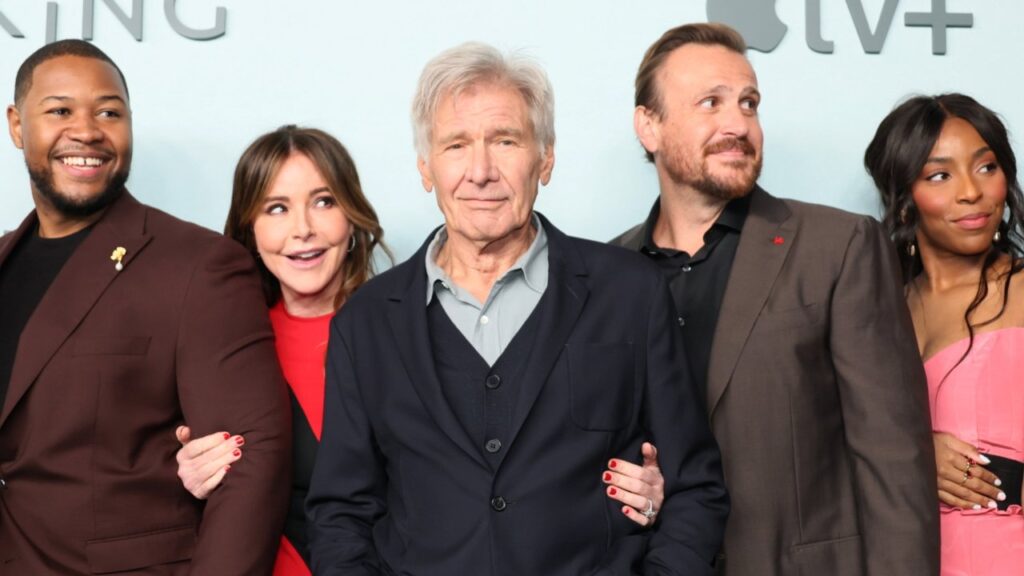
Shrinking may not be packed with rapid-fire jokes or big comedic moments, but it succeeds in creating an emotional space that feels genuine, comforting, and deeply resonant. The series doesn’t use comedy as a distraction or a way to gloss over the heavier themes; instead, it uses humor gently, weaving it in to support the show’s deeper messages of resilience, connection, and growth.
By the end of the first episode, I felt drawn into this world not because it was outrageously funny but because it felt real, grounded in the messiness of life and the complexity of healing. I was left eager to see where Jimmy’s story would go, curious about how his relationships with Alice, Paul, and Sean would evolve as they each continued to face their own struggles.
Apple TV+ has proven itself to be a platform that values thoughtful, introspective storytelling, and Shrinking is a perfect example of this approach. It’s not just another comedy, it’s a heartfelt exploration of grief and personal growth, a story that respects the nuances of human emotion and the gradual nature of healing.
In a time where streaming services are flooded with content competing for attention, Shrinking stands out as a quietly impactful addition to Apple TV+’s lineup. Its balance of humor and heart, combined with its commitment to authenticity, makes it a series worth watching for anyone seeking a story that feels both deeply personal and universally relatable.
Click here for my latest posts!